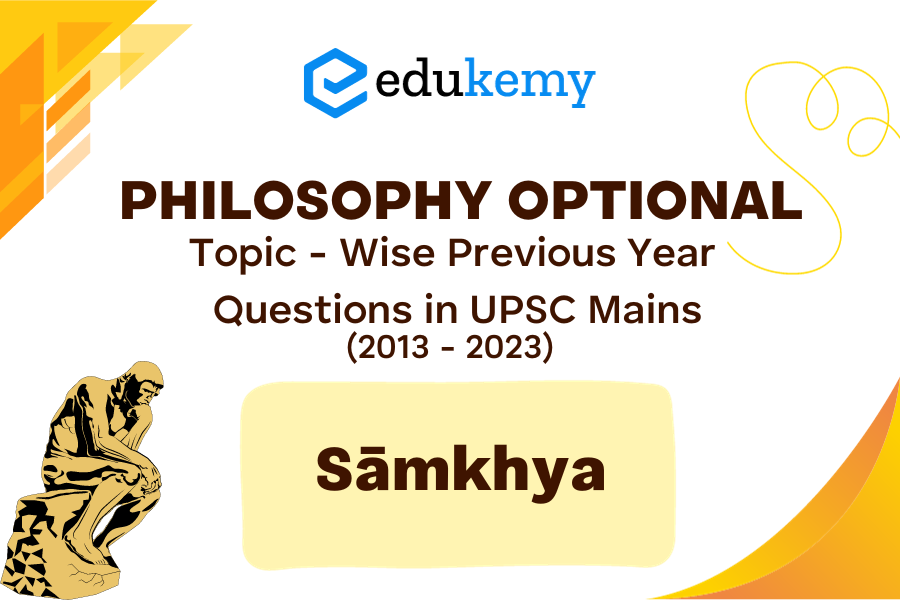
If you’re an aspiring civil servant preparing for the UPSC Mains examination, you’re no stranger to the extensive syllabus and challenging topics that you need to master. One such optional subject that often raises eyebrows is Philosophy. Yet, it’s a subject that has been gaining popularity among UPSC aspirants due to its unique blend of critical thinking, ethics, and metaphysical concepts. In this blog series, we’ll delve into the previous year’s questions on philosophy, a key component of the Philosophy optional paper. We’ll explore the questions asked between 2013 and 2023, dissecting the themes, key concepts, and approaches that will help you excel in this subject and ultimately, in your UPSC journey. So, if you’re ready to embark on a philosophical exploration to secure your success in the UPSC Mains, let’s dive into the world of Sāmkhya philosophy and its relevance in contemporary civil services examinations.
Sāmkhya philosophy, with its deep roots in Indian thought, touches upon the fundamental questions of existence, consciousness, and reality. Its intricate blend of theory and practice can be a tough nut to crack, but with the right guidance and a thorough understanding of previous year’s questions, you can navigate through it effectively. In this series, we’ll not only provide you with insights into the questions but also offer strategies for answering them and preparing comprehensively. We aim to make this philosophy an accessible and rewarding subject, fostering a holistic understanding that goes beyond mere rote memorization. So, whether you’re a seasoned Philosophy enthusiast or just starting to explore this optional subject, join us in this illuminating journey as we uncover the wisdom embedded in the UPSC Mains through the lens of Sāmkhya philosophy.
Contents
- 1 Sāmkhya Philosophy – Previous Year Questions (UPSC CSE Mains History Optional)
- 2 FAQs
- 2.1 Q: What is Sāmkhya philosophy, and how does it differ from other Indian philosophical systems?
- 2.2 Q: What are the core principles of Sāmkhya philosophy?
- 2.3 Q: How does Sāmkhya philosophy address the concept of suffering and liberation?
- 2.4 Q: What are the key texts that explain Sāmkhya philosophy?
- 2.5 Q: How can Sāmkhya philosophy be relevant in modern times?
- 3 In case you still have your doubts, contact us on 9811333901.
Sāmkhya Philosophy – Previous Year Questions (UPSC CSE Mains History Optional)
1. Given the theory of causation , is it possible for Samkhya to explain the presence of consciousness in the world ? Discuss. (2017/15)
2. Critically examine the role of ‘Prakriti’ in the process of evolution.(2016/10)
3. Satkaryavada (2015/10)
4. State and examine Samkhya proofs for the existence of Purusa.(2015/15)
5. Examine the Samkhya view about liberation that “ self is neither bound nor liberates , nor transmigrate.” (2014/15)
6. How is theory of causation central to the theory of reality in classical Indian tradition. ? Discuss. (2014/20)
7. Are the arguments given in favour of existence of Prakriti adequate in Samkhya’s philosophy ? Discuss. (2014/10)
8. Evaluate relation ‘if any’ between prakriti and purusha .(2013/12 ½)
9. Explain the possibility of jivanmukti . Critically compare it with the Yoga account of kaivelya . (2013/10)
10. How Samkhya theory of causation is different from that of Nyaya theory of causation ? Explain .( 2012/15 )
11. Examine Sankhya’s arguments for Bahupurusavada (Plurality of Purusa). (2011/30)
12. Does the effect pre-exist in the cause? Discuss. (2010/15)
13. Compare Aristotle’s view regarding causation with that of the Samkhya School’s view of Causation. (2009/60)
14. Explain the Samkhya doctrine of three gunas. (2007/60)
15. Critically discuss the Samkhya theory of Causation. (2006/60)
16. Samkhya conception of Purusha. Short notes. (2005/20)
17. The Samkhya doctrine of liberation. Short Notes. (2003/20)
18. Samkhya theory of Evolution of Prakriti. Short Notes. (2002/20)
19. Evaluate the Samkhya justification for their theory of Purusa. (2001)
FAQs
Q: What is Sāmkhya philosophy, and how does it differ from other Indian philosophical systems?
A: It is one of the six classical schools of Indian philosophy. It’s unique for its dualistic approach, distinguishing between puruṣa (consciousness) and prakṛti (matter), while most other schools explore monistic or non-dualistic perspectives.
Q: What are the core principles of Sāmkhya philosophy?
A: This philosophy posits 25 tattvas or principles, with puruṣa and prakṛti being the most fundamental. Other principles include the three guṇas (qualities), mahat (cosmic intellect), and ahaṅkāra (ego).
Q: How does Sāmkhya philosophy address the concept of suffering and liberation?
A: Sāmkhya recognizes that suffering arises from the identification of puruṣa with prakṛti and aims to attain liberation (kaivalya) by distinguishing the two. This separation leads to freedom from suffering and rebirth.
Q: What are the key texts that explain Sāmkhya philosophy?
A: The Sāmkhya philosophy is primarily expounded in the Sāṅkhya Kārikā by Kapila and the Sāṅkhya Sūtras by Īśvarakṛṣṇa. These texts are foundational for understanding the intricacies of the philosophy.
Q: How can Sāmkhya philosophy be relevant in modern times?
A: Sāmkhya philosophy offers valuable insights into the nature of the self, consciousness, and the material world. It can be applied to various fields, such as psychology, yoga, and even contemporary debates on the mind-body problem and holistic well-being. Its enduring relevance continues to influence thought and practice today.
In case you still have your doubts, contact us on 9811333901.
For UPSC Prelims Resources, Click here
For Daily Updates and Study Material:
Join our Telegram Channel – Edukemy for IAS
- 1. Learn through Videos – here
- 2. Be Exam Ready by Practicing Daily MCQs – here
- 3. Daily Newsletter – Get all your Current Affairs Covered – here
- 4. Mains Answer Writing Practice – here

